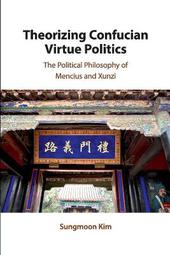
|
Theorizing Confucian Virtue Politics: The Political Philosophy of Mencius and Xunzi
Paperback / softback
Main Details
| Title |
Theorizing Confucian Virtue Politics: The Political Philosophy of Mencius and Xunzi
|
| Authors and Contributors |
By (author) Sungmoon Kim
|
| Physical Properties |
| Format:Paperback / softback | | Pages:251 | | Dimensions(mm): Height 229,Width 152 |
|
| Category/Genre | Social and political philosophy |
|---|
| ISBN/Barcode |
9781108460569
|
| Classifications | Dewey:181.112 |
|---|
| Audience | | Professional & Vocational | | Tertiary Education (US: College) | |
|---|
| Illustrations |
Worked examples or Exercises
|
|
Publishing Details |
| Publisher |
Cambridge University Press
|
| Imprint |
Cambridge University Press
|
| Publication Date |
19 August 2021 |
| Publication Country |
United Kingdom
|
Description
Surprisingly little is known about what ancient Confucian thinkers struggled with in their own social and political contexts and how these struggles contributed to the establishment and further development of classical Confucian political theory. Leading scholar of comparative political theory, Sungmoon Kim offers a systematic philosophical account of the political theories of Mencius and Xunzi, investigating both their agreements and disagreements as the champions of the Confucian Way against the backdrop of the prevailing realpolitik of the late Warring States period. Together, they contributed to the formation of Confucian virtue politics, in which concerns about political order and stability and concerns about moral character and moral enhancement are deeply intertwined. By presenting their political philosophies in terms of constitutionalism, Kim shows how they each developed the ability to authorize the ruler's legitimate use of power in domestic and interstate politics in ways consistent with their distinctive accounts of human nature.
Author Biography
Sungmoon Kim is Professor of Political Theory and Director of the Center for East Asian and Comparative Philosophy at City University of Hong Kong. He is the author of Confucian Democracy in East Asia: Theory and Practice (Cambridge, 2014), Public Reason Confucianism: Democratic Perfectionism and Constitutionalism in East Asia (Cambridge, 2016) and Democracy after Virtue: Toward Pragmatic Confucian Democracy (2018).
Reviews'A systematic reconstruction of the political theories of two of the leading classical Confucian thinkers, Mencius and Xunzi, by one of the rising stars of East Asian political theory. Sungmoon Kim's new book lays out a theory of Confucian constitutionalism oriented around civic virtue and ritual. In this important contribution to political theory and the history of political thought, Kim displays the clarity and deep erudition that his readers have come to expect.' Stephen Macedo, Princeton University, New Jersey 'Professor Sungmoon Kim has already established an international reputation with his previous books on Confucian democracy. His latest work, Theorizing Confucian Virtue Politics, is sure to solidify his place as a leading contemporary political theorist and scholar of Confucianism. This book is sure to be of great interest to scholars across a variety of fields, including philosophy, political science, Sinology, history, and religious studies.' Bryan W. Van Norden, Vassar College, New York 'With characteristic thoroughness, depth, and breadth, Sungmoon Kim's new book enables a broader audience to appreciate the political theories of Mencius and Xunzi ... Of particular note is Kim's reflection on the global political theory of these thinkers and how they wrestled with interstate conflict while maintaining their virtue politics. Kim illuminates the foundational debates of virtue politics, inviting all of us to think about how these are and might be important in the current global era.' Brooke Ackerly, Vanderbilt University, Tennessee 'Nuanced and lucid ... [Kim's] analysis of the political philosophy of these seminal figures in terms of virtue constitutionalism, ritual constitutionalist, positive Confucianism and negative Confucianism is both refreshing and insightful. I highly recommend this book to everyone who is interested in Confucian philosophy and political theory.' Chenyang Li, Nanyang Technological University 'Theorizing Confucian Virtue Politics provides a newly elaborated, classical Confucian constitutionalism ... Venturing into some largely unknown territory, this book should invigorate further work on the parts of comparative philosophers and Western virtue theorists.' D. P. Prianti, Choice
|